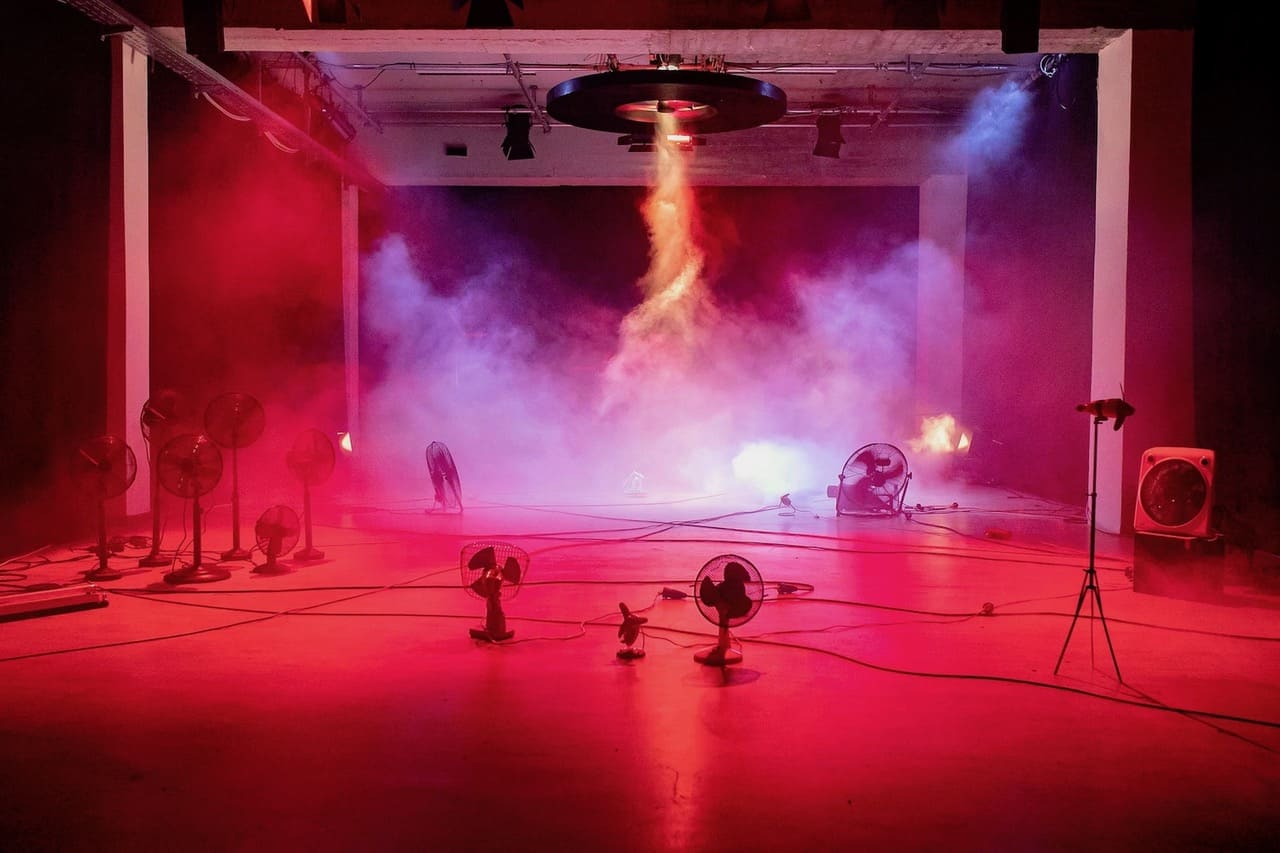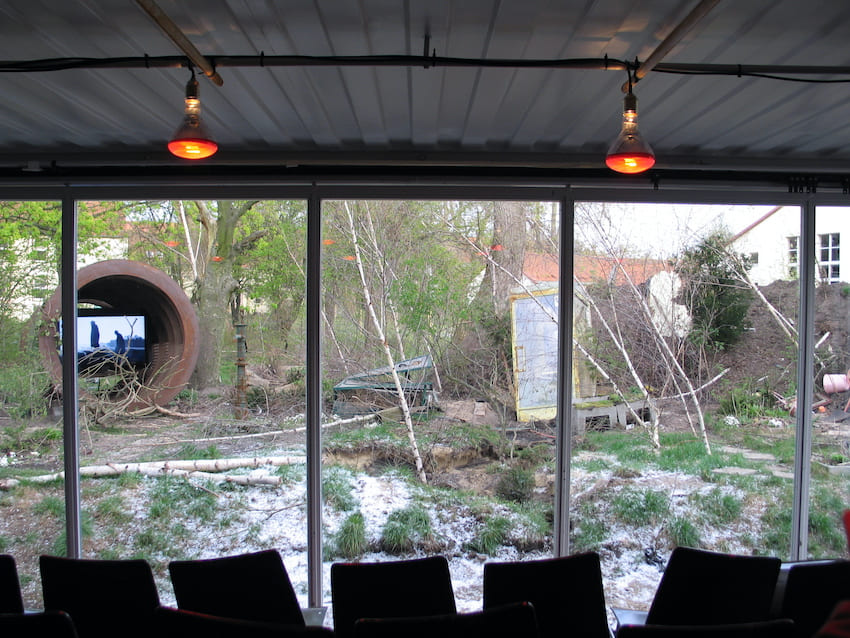Tobias Rausch
Ore crates, shampoo bottles and intelligent mushrooms
Translation in English
He sat down on the ore crate for breakfast – on the crate with the uranium, just like all the miners did underground. The next day his whole abdomen was swollen and everything hurt. But that didn’t stop him from going further into the shaft. Thirty years later came leukaemia, then lymph node cancer and finally bowel cancer. From 1947 to 1990, uranium was mined in the Ore Mountains for the Soviet nuclear weapons programme. Drilling and extraction were carried out without any regard for the local population or the environment. Over the course of just a few years, sleepy villages were transformed into dusty moonscapes of spoil tips, mine shafts and processing factories. Decades later, these former mining areas have been transformed into parkland or normal industrial estates. It is almost unimaginable that the world’s largest uranium mining company was once active her.
So what can we imagine? We are living in a crisis of the imagination. In the production TAUSEND SONNEN (Premiere: 28.11.2022, Staatsschauspiel Dresden), we brought six former miners and residents of the uranium mining area on stage and explored the narratives that define their lives with them and the memory of their time underground. During the rehearsal process, it became clear time and again how intangible the invisible, odourless and initially imperceptible consequences of radioactivity remained for those involved. And even today, most people seem to be under the impression that the problem has disappeared with the dismantling of the winding towers.
Whilst people knew and still know about the dangers that lie dormant underground and in the body’s cells, these dangers always seemed and still seem to only affect others. Instead, many life stories from the era are characterised by pride in their own achievements and the fact that they belonged to a particularly privileged population group in the GDR. Perhaps the narrative approach to radioactivity is paradigmatic of a problem we have today in dealing with the ecological crises of our planet.
In his essay «The Great Derangement», the Indian novelist Amitav Ghosh argues that Western-influenced literature has contributed to a crisis of the imagination. By focussing on human protagonists at the time of the Enlightenment, it excluded nature as an actor in stories and degraded it to a mere backdrop for human conflicts. It became a resource that could be exploited, a recreational landscape or «beautiful nature» for edification. There was also a colonial aspect to this view, in which the world beyond the European metropolises (with their cultural defining power and economic-military potency) was reduced to a mere hinterland without its own history. And now that we have forgotten how to recognise non-human actors (such as radioactive ore or a storm) as the protagonists of our stories, today we find it very difficult to talk about the climate crisis, the destruction of habitats or the extinction of species in a way that affects us.
In the production TORNADO (première: 12.09.2020, Theaterdiscounter Berlin), we addressed the question of why we are failing to take appropriate measures to combat the climate crisis. In a scene based on an interview with a climate scientist, the character reflects on her shock when she stands in front of a shelf of shampoo bottles in a chemist’s after an expedition lasting several months in the Siberian Arctic Ocean. On the ship, she experienced the climate crisis at first hand, saw with her own eyes how gigantic areas that used to form a landscape of pack ice and crystal-clear skies are now a murky soup of lumps of ice and grey fog. Then she returns, everyday life just goes on, with countless brands of shampoo in the supermarket made with petroleum-based oils, flavoured and scented and packaged in plastic bottles, and she feels unable to convey the drastic nature of her experience to those at home. Her research results are so complex, often only penetrable with mathematical models and generated by powerful computers, that she falls victim to a sense of communicative resignation: nobody can imagine it.
She thereby describes a fundamental problem of our modern approach to nature, which we also encountered again and again in our five-year botanical long-term theatre project DIE WELT OHNE UNS (THE WORLD WITHOUT US) (2009 – 2014, Staatstheater Hannover). In this production, we tried to make plants the protagonists of a theatre play. In a total of nine episodes, we set up a public container with a glass pane on a former barracks site and created a garden that has artificially gone wild over the years. The idea behind the project of learning to see plants as individuals with a specific history, which we explored in various performance and theatrical arrangements, repeatedly stumbled over the challenge that human and plant scales of size and time are far apart.
Communication, defence and reproduction processes take place via chemical, intra-plant and subterranean pathways that we are unable to perceive directly. This supposedly means that access is possible via scientific processing only, which turns the individual into a representative of a species and genus, eliminates chance and fate via statistical quantification and reduces their history to an episode in an evolutionary process. Or we start to anthropomorphise, and give the plant a human voice and then whisper about the conversations trees have with the each other and the intelligence of fungi. Nature is transformed into a puppet theatre that is animated by our human ideas of stories. And in this context we are unable to perceive the plant as a plant in its way.
It is clear how high the historically grown hurdles are, how much our perception and our aesthetic languages are shaped by the marginalisation of nature. The crisis of the imagination leads directly to the question of how we understand ourselves as human beings and our position in the cosmos.
In the second part of TORNADO, the audience enters a hall in which an installation of fans has been set up. To a collage of sound, music and fragments of voices, the fans gradually set themselves in motion, forming fleeting synchronous or counter-rotating patterns with the rotation of their propellers and the oscillating movement of their heads in space, entering into dialogue with each other, fighting against gravity or bumping into each other. The air in the room is stirred up by the fans and set in motion; it forms cascades, flowing patterns and turbulence. At some point, at an unpredictable moment, a spiralling vortex develops in the middle of the room, which gradually thickens and becomes higher and higher. More and more air particles are drawn into the rotating movement and then, suddenly, a tube-shaped trunk stretches up towards the ceiling of the hall. A real, artificial tornado about 4-5 metres high has formed in front of the audience. It dances back and forth, sometimes tilting in one direction, then in the other. At times its tube is wide and strong, then fragile and thin, then it collapses and seems to disappear, only to eerily reappear the next moment.
In his essay, Amitav Ghosh writes about a tornado in his home city of Delhi, which he faces «eye to eye». He thought he could feel the hurricane looking at him. As if it were a being that recognised him. So it is not we who have to subjectify nature in order to recognise it as a counterpart. Instead it is nature that views us by taking shape before our eyes and confronting us. Ghosh describes quite precisely what can happen in the theatre if we accept that we humans are no longer the protagonists who determine the plot with their intentions. Perhaps these are only momentary experiences in which a glimmer of imagination flickers behind the crisis of the imagination. It is possible that they do not correspond to the human pattern of a story, do not recognise the difference between plot and background and do not follow the linear model of time that structures our own narrative space. They are fragile, temporary, erratic, non-determinable and refuse to be available to us. But they tell of the possibility of theatre to make the unimaginable tangible and to be affected by this experience, even if it eludes our traditional ideas of theatre.

Tornado

Welt ohne uns